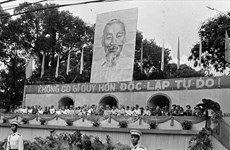Asia-Pacific determined to eradicate malaria
Health experts from 17 countries are discussing challenges to achieve
a malaria-free Asia-Pacific region by 2030 at a meeting of the
Asia-Pacific Malaria Elimination Network (APMEN).
Health experts from 17 countries are discussing challenges to achieve
a malaria-free Asia-Pacific region by 2030 at a meeting of the
Asia-Pacific Malaria Elimination Network (APMEN).
The 4-day event began in the town of Hoi An, the central province of Quang Nam, on March 25.
During the meeting, participants expressed their concern over the cutting of public spending on combating malaria across the region.
They emphasized a major challenge posed by artemisinin-resistant malaria for the regional control and elimination efforts.
Participating experts also lauded achievement made by APMEN members, including Vietnam, in curbing the virus’ spread.
As of 2014, Vietnam had reduced its malaria cases by 90 percent and malaria deaths by nearly 96 percent from 2000. The health ministry said the country reported only six malaria deaths and no outbreaks in 2014. Vietnam targets to completely eradicate the disease by 2030.
According to Dr Ngo Duc Thang from the National Institute of Malariology Parasitology and Entomology, the goal this year is to lower the number of malaria infections to less than 0.15 cases per 1,000 people and mortalities to 0.02 cases per 100,000 people. The country expects to eradicate the disease in 15 provinces and cities in 2015.
Vietnam will focus on improving its capacity for early detection of infections, developing a warning system, and upgrading medical facilities for treatment in vulnerable localities, he said.
Founded in 2009, APMEN has provided a critical platform for countries to share knowledge on common challenges, promote cross-border collaboration and strengthen regional malaria eradication in the Asia-Pacific region by 2030.-VNA
The 4-day event began in the town of Hoi An, the central province of Quang Nam, on March 25.
During the meeting, participants expressed their concern over the cutting of public spending on combating malaria across the region.
They emphasized a major challenge posed by artemisinin-resistant malaria for the regional control and elimination efforts.
Participating experts also lauded achievement made by APMEN members, including Vietnam, in curbing the virus’ spread.
As of 2014, Vietnam had reduced its malaria cases by 90 percent and malaria deaths by nearly 96 percent from 2000. The health ministry said the country reported only six malaria deaths and no outbreaks in 2014. Vietnam targets to completely eradicate the disease by 2030.
According to Dr Ngo Duc Thang from the National Institute of Malariology Parasitology and Entomology, the goal this year is to lower the number of malaria infections to less than 0.15 cases per 1,000 people and mortalities to 0.02 cases per 100,000 people. The country expects to eradicate the disease in 15 provinces and cities in 2015.
Vietnam will focus on improving its capacity for early detection of infections, developing a warning system, and upgrading medical facilities for treatment in vulnerable localities, he said.
Founded in 2009, APMEN has provided a critical platform for countries to share knowledge on common challenges, promote cross-border collaboration and strengthen regional malaria eradication in the Asia-Pacific region by 2030.-VNA












